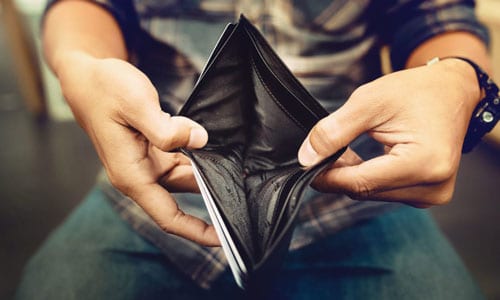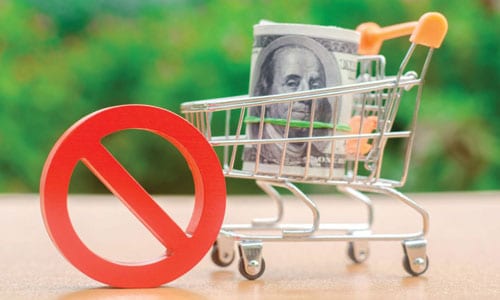Making It Through Tough Financial Times

Whether you are still a student or have started your career, chances are you are feeling the pinch of this economy. You may feel like you are entirely squeezed dry but when you focus on saving money, there are quite a few areas you can cut back.
Only Buy Essentials – This goes for food, clothing and life extras. Instead of buying name-brand snacks, try the store brand. Swap out takeout lunches for brown bag meals you make at home. Try to get another season out of your coat. You don’t have to exist solely on peanut butter and jelly sandwiches or walk around in rags but you do need to shop smart and stick to the basics.
Only Buy Items On Sale – When you are shopping, look for sales. Coupons also come in handy too – especially since some stores double them. If you utilize both tactics (sales and couponing), sometimes the additional discount could be applied to the overall total of your shopping cart. Another tip is to buy clothing after that particular season’s sale has begun. Or shop at consignment shops. You’ll still get high-end stuff at a fraction of the cost.
Cut Out Unnecessary Expenses – Calculate how much money you spend dining out, going to the movies and meeting friends after work. Road trips to visit buddies and vacations with family and friends is another culprit sabotaging your budget. Consider the popular “staycation” fad. Check out all of the natural, historical and interesting activities and locations in your local area. You may be surprised at what a fun “trip” you have!
Take On A Part-Time Job – Moonlighting is a great way to bring in some extra cash – especially during the holidays or over the summer. Depending on your job, a part-time gig can also provide you with a generous discount, which will save you even more money. A handy tool if it’s a location you already frequent.
Cut Back On Amenities And Utilities – How much do you watch cable? Do you really need a “smartphone” when you have the Internet at your apartment? Could you get away with turning the heat down a few degrees or switch the air conditioning off at night? Evaluate your bills and see where you can trim off some excess.
Stop Spending Challenge

Can you challenge yourself to go one month without spending cash on things that aren’t absolutely essential? This is tough work but by going 30 days without unnecessary shopping, you can help get your budget under control.
On average, it takes about a month to break a habit. If you are a big spender, this is a great way to change your behavior. It’s also a way to examine your relationship with money. Often people spend money due to emotions. Do you shop when you are stressed or upset? Do you do it when you are frustrated? By using this strategy, you will have a great understanding of how you spend money – and why.
Before you begin, you can decide what is essential to your life; however, be realistic. Is that daily latte an essential item? For the most part, try to get by on what you already have, make meals at home and think before you make every purchase.
At the end of this experiment, chances are, you’ll have something extra in your account. At the very least, you’ll have some understanding of what makes you buy the things you do and the triggers that cause you to make purchases.
Tips For Saving For That Trip

Whether you are hoping to head somewhere fun and warm for Spring Break this year or thinking about a post-grad European adventure someday, the best way to swing for a trip is to start saving…now.
Break Out The Calculator – Different trips require different levels of planning. If you are heading across the country, your trip will cost hundreds more than a trip to your local beach. Consider all costs and divide that by the number of months you have to save. Once you do that, you’ll have your savings goal.
Go Away For $3.50 A Day – Saving merely $3.50 a day turns into $25 a week, which is $100 a month and a whopping $1,200 a year! Before you make a purchase think about whether or not you’re buying something essential. Every little bit adds up!
Open A Special Savings Account – That $1,200 a year does not include dividends, which is the additional money all that cash will earn when you deposit it in an account at your credit union. Deposit your money each at the credit union week and make your money work for you.
Bump Up Your Savings – Once you have a few hundred dollars in your account, consider bumping up to a Share Certificate, which will provide you with higher yields with little risk. Often with as little as $500, you can move your money into a Share Certificate, which locks your money into a specified term anywhere from 90 days up to 5 years. This means you can’t touch the money until the certificate “matures.” If you do, there will be a hefty penalty; so plan accordingly.
Be Realistic – When you travel, you’ll need more than money for airfare and lodging. Don’t forget money for expenses like food and entertainment. You don’t want to say you traveled to an exotic location and stayed in your hotel room the entire time. If you aren’t doing an all-inclusive trip, make sure you plan for everything that might come up. Even if you are staying at an all-inclusive resort, set aside some cash for tours, souvenirs, and tips.
Tell Your Friends – Perhaps most importantly, be sure you share these tips with your friends so you have a travel partner! Bon voyage!
The Emergency Fund

You never know what can happen, right? You can run into car trouble, a crashed computer or even unexpected health issues. No matter what happens, you should be prepared financially to handle the unexpected costs that might come your way.
To do this, you should build an emergency fund. An emergency fund will offer peace of mind and give you a bit of a safety net. Here’s how to get started:
Build your emergency fund based on your income. When you receive your monthly or weekly paycheck, allot a separate, predetermined amount for savings, spending and for your emergency fund. Although you might take your time building this fund and it might start quite small, the point is, it will be there when you need it.
Don’t ever tap into the account until you absolutely need it. If you are thinking about dipping into the funds, think about the potential emergencies that could arise; hopefully, this will curb your urge.
If something does happen, calculate the costs and be ready to use the funds. Although you might feel a little guilty about spending the money you worked so hard to save, remember it is there specifically for emergencies and was created to help cushion your pocket when these things happen.
An emergency fund is a great thing to have and allows you to be ready for the worst. And think about it – if you never have to use the money, it is there as additional savings and will make you feel more comfortable about your financial status.
